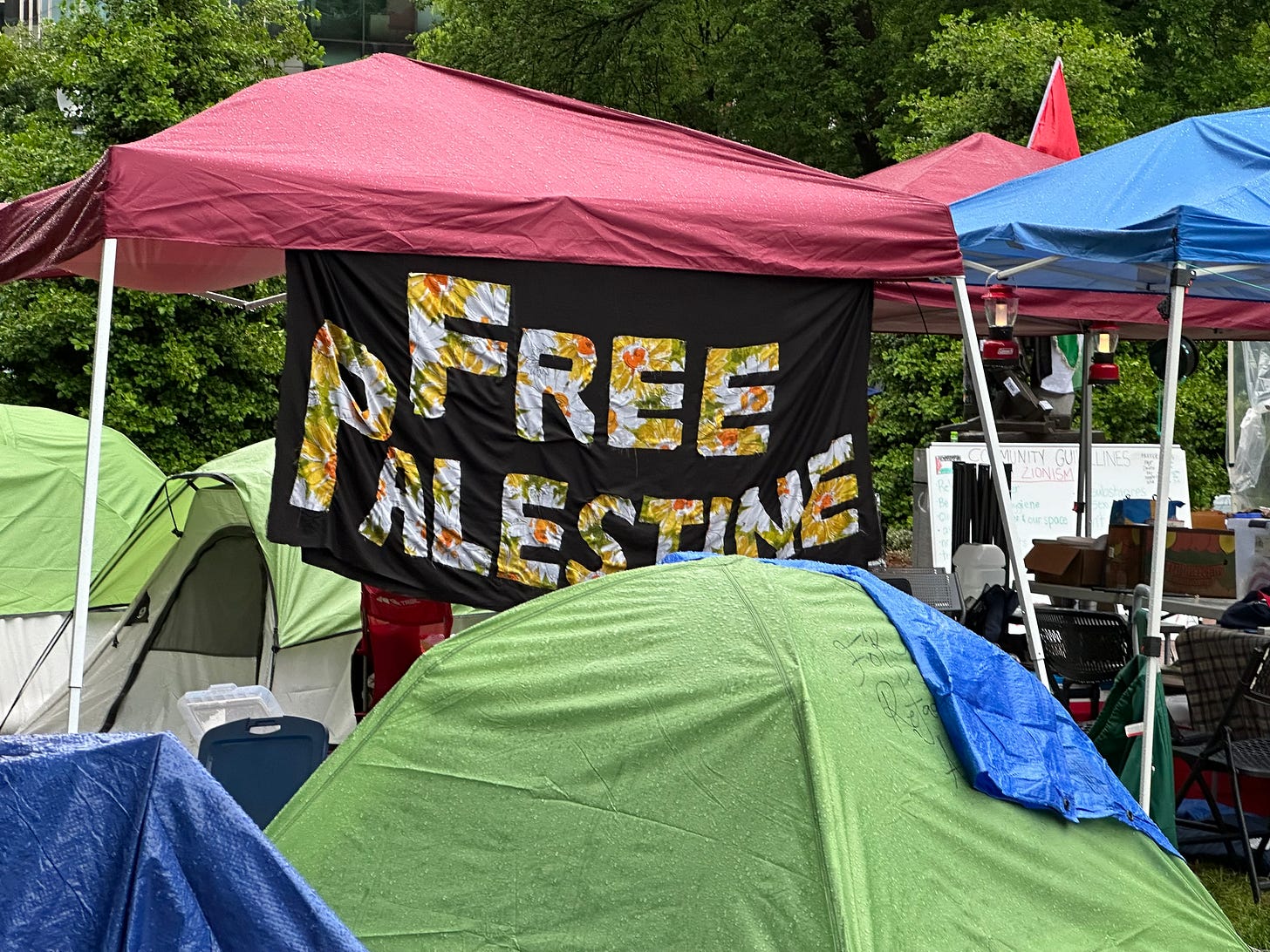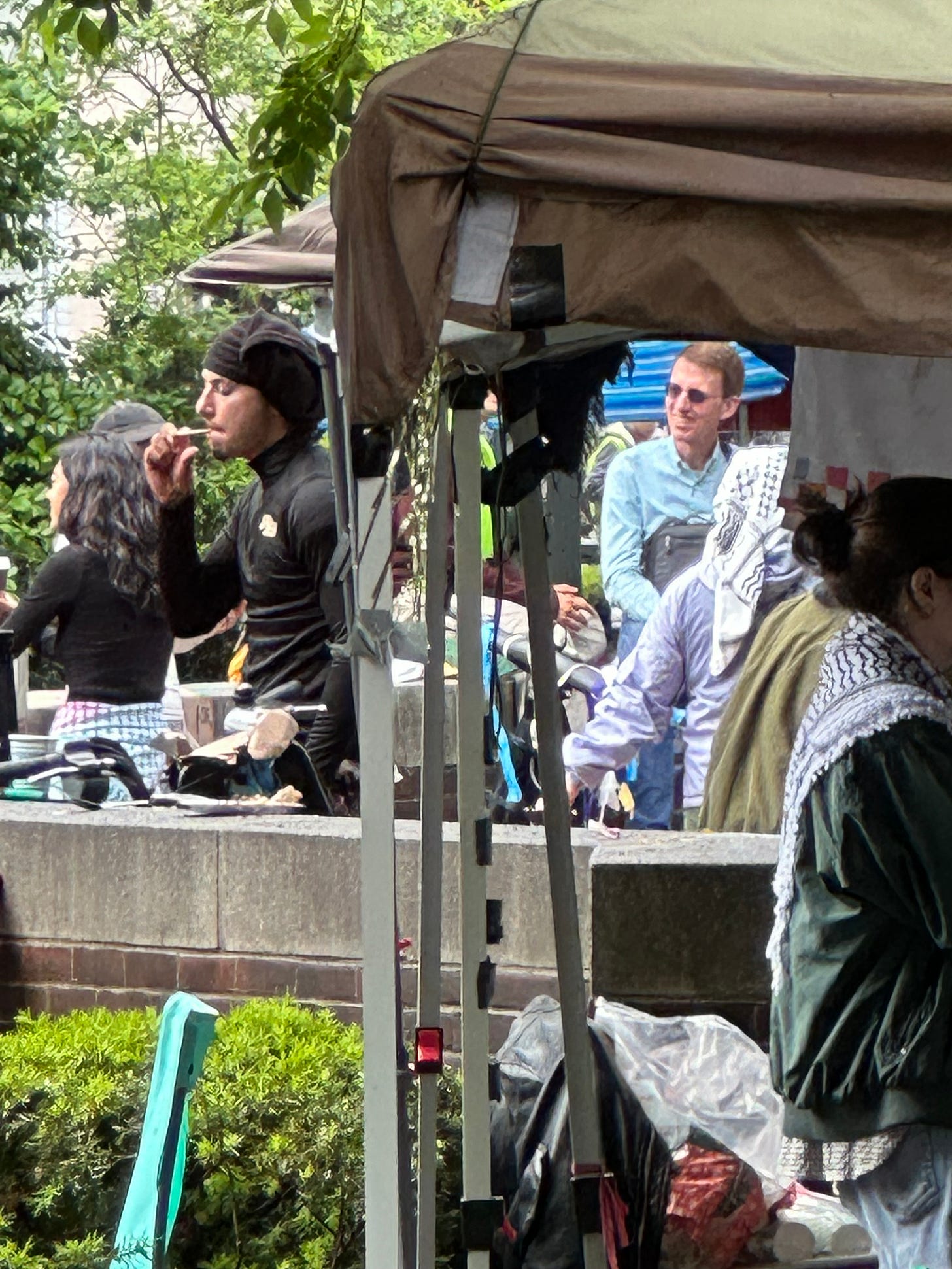The church as disruptive public realm
Our interview at GW's encampment takes us back to Acts
The most essential thing I learned in kindergarten (with all due respect to Miss Morris) is that I can't choose my teachers. A few years later, in Sunday school, I learned also that I can't choose which characters Jesus parabolically compares to God. I learned there that I can't even choose which kind of people Jesus parties with. But as I get older, those people turn out to be wonderful. Sometimes they become my teachers.
So for Christians who may not wish to learn from pro-Palestinian protesters, I invoke Naaman, the powerful but parochial army commander, who almost lost out on losing his leprosy because the Jordan didn't flow in his native Syria.1

I learned about long-lost church last weekend at George Washington University's short-lived, pro-Palestinian encampment. My schooling started when I found their community guidelines posted among a sea of tents:
The encampment's guidelines read something like the list from Robert Fulghum's popular book on vital and lifelong kindergarten practices, which include "share everything," "clean up your own mess," and "flush."2 Kindergarten is the academic level closest to communal living, according to many of its tissue-toting teachers, but the freshman college experience must come in a close second. Most college students leave behind monkish, single-person bedrooms in single-family homes. Manny, the GW encampment marshal whom we interviewed, thinks freshmen-year dorm life made sharing tents in the encampment easier:
Fulghum's list of lifelong kindergarten lessons also includes this one: "When you go out into the world, watch out for traffic, hold hands, and stick together."3 Great advice. But unlike kindergarten class and most other communities, an encampment is always "out into the world." It’s deliberately public.
It’s also disruptively public. Even an encampment that remains peaceful and doesn’t engage with agitators is disruptively public. Simply by asserting a physical community on a college green, an encampment also asserts an alternative public life. By its very appearance, an encampment challenges a certain monopoly of public space, a monopoly which also appears as soon as it is challenged.
In this living, communal challenge, even the private stuff can have public ramifications. One must be disciplined.
Just ask the writers of the New Testament's epistles.
Let’s play a game. Match the items in the encampment's guidelines above with these clips from the New Testament’s epistles:
"Flee sexual immorality." - 1 Corinthians 6:18 (NNAS)
". . . persist in prayer . . ." - Romans 12:12 (REB)
"Do not lie to one another, now that you have discarded the old human nature and the conduct that goes with it . . ." - Colossians 3:9 (REB)
"Grace be with you all." - Hebrews 13:25
". . . anyone who will not work shall not eat." - 2 Thessalonians 3:10 (REB)
"We urge you, friends, to rebuke the idle, encourage the faint-hearted, support the weak, and be patient with everyone." - 1 Thessalonians 5:14 (REB)
"Honor all people . . ." - 1 Peter 2:17 (NNAS)
“Stop drinking only water; in view of your frequent ailments take a little wine to help your digestion.” - 1 Timothy 5:23 (REB)
"It is for discipline that you endure . . ." - Hebrews 12:7 (NNAS)
". . . make my joy complete by being of the same mind, maintaining the same love, united in spirit, intent on one purpose." - Philippians 2:2 (NNAS)
". . . do not get drunk with wine, in which there is debauchery . . ." - Ephesians 5:18 (NNAS)
"Keep your behavior excellent among the Gentiles . . ." - 1 Peter 2:12 (NNAS)
" . . . you yourselves are . . . well able to give advice to one another . . ." - Romans 15:14 (REB)
". . . run with endurance the race that is set before us, looking only at Jesus . . ." - Hebrews 12:1-2 (NNAS)
" . . . but brother goes to law with brother, and that before unbelievers?" - 1 Corinthians 6:6 (NNAS)
"Cleanliness is next to godliness." - JK
"Let hope keep you joyful . . ." - Romans 12:12 (REB)
Okay, maybe everything doesn't match up. Along with the cleanliness thing, I threw in a couple of favorite verses for fun.
The point is, when I first read the encampment’s guidelines, I decided I might have been reading a gloss of a prototypical Pauline letter.
The similarities suggest to me that perhaps we're wrong to take the New Testament epistles as chapters in an instruction manual for a private, heaven-bound existence that poses no threat to the powers that be.
True religion’s subversive, civic purpose
Paul's letters, like the GW community guidelines, were written to encourage and help those who took on a new life in an alternative polis, a Greek word which typically refers to a sovereign city and by extension to a sovereign state. Paul’s letters were not intended to help people figure out how to leave the earth for heaven. They were intended to help people who are engaged in heaven's communities and government on earth until heaven comes fully to earth.
Paul's understanding of religion wasn't like ours, separated from politics. Paul's "religion," like Rome's religion, had a civic purpose. According to N.T. Wright, Paul assumed "that ‘religion’ is what strengthens and unites the polis – with the difference that the polis in question consists of the Messiah’s people, those whose politeuma is ‘in the heavens’ against the day when heaven and earth are brought together at last ([Philippians] 3.20–1)."4
For Paul, the ekklēsia constituted "a new kind of polis," Wright says.5
Like the pro-Palestinian encampments, the ekklēsia in Acts began by occupying public space. In the days after Pentecost, the disciples “kept up their daily attendance at the temple,” which wasn’t much like what we’d today call going to church. Instead, Luke’s report suggests that the ekklēsia got together daily “in the temple courtyard . . . the central public space in Jerusalem,” according to theologian Richard A. Horsley. Jesus’s disciples were setting up an alternative civil society in Jerusalem’s public space:
They were “all together” (epi to auto) in the sense of the assembly of Israel . . . Similarly, the term homothumadon in the phrase translated “they spent much time together” also suggests that the Acts account is representing them as the true assembly of Israel . . .”6
“Popular assembly” is a better translation of ekklēsia than is “church,” Horsley says: ekklēsia at the time of Luke’s writing referred to the Greek popular governmental assemblies that had gradually become powerless under Rome’s thumb. In Acts, at last, part of Israel began governing itself, ignoring Israel’s status as a Roman client. Jerusalem’s revolution represented a revival of local popular rule that had died under empire:
. . . ekklēsia suggested that the local communities of the movement were the assembly of the people of Israel. The movement of the renewal of Israel was expanding along the interstitial lines in the Roman imperial order that allowed for communities that were “in but not of”—and even resistant to—the imperial system.
As a whole, Luke’s book of Acts doesn’t account for the advent of a new religion finding its way out of Judaism. Instead, it accounts for a revolution—as Horsley puts it, “a movement of the renewal of Israel, only now open to other subject peoples.”7
The ekklēsia doesn’t serve nationalism or liberalism
It's this "other subject peoples" that assures us that the ekklēsia doesn't serve nationalism. The ekklēsia crosses national borders, Wright points out:
. . . for Paul at least, those who belonged to the Messiah were a new kind of polis, a non-geographical and non-ethnic polis to be sure, but nevertheless a real community of actual human beings stretching across space and, it seems, back through time as far as those Paul refers to as ‘our fathers’, the exodus generation, and ‘our father’ Abraham himself.8
While church-as-polis can't serve nationalism, it also can't serve liberalism. Professor Luke Bretherton finds God's kingdom, as expressed by the church, at odds with compact theories from Thomas Hobbes to the present:
In individualist-contractualist theories of sovereignty, from Hobbes onward, the church is the primal enemy, as it is the paradigmatic form of an alternative source of sovereign authority that relativizes the claims of the political sovereign.
Bretherton understands the kingdom of God as an authority that "relatives all forms of political order and radically questions all social and political hierarchies."9 Because the ekklēsia is the present polis of God’s kingdom, it can’t be in league with any sovereign of what Paul calls “this present evil age.”10
10 days of Hebrews 10
In just the ten days from the GW encampment’s inception on April 25 until my second visit there (two days before the encampment’s destruction early on May 8), its community went through something like four stages. It lived through the exhilaration of a new public life together, then an initial crackdown by the authorities, then a period of relative laxity, and then a correction—that is, a period of renewed discipline. Manny describes these phases to explain the creation of the community’s whiteboard guidelines:
These four stages sound like a miniature and less violent version of the revolutionary stages the writer of the New Testament’s letter to the Hebrews describes happening in Jerusalem from Pentecost forward:
Remember those early days when, newly enlightened, you met the test of great suffering and held firm. Some of you were publicly exposed to abuse and tormented, while others stood loyally by those who were so treated. For indeed you shared the sufferings of those who were in prison, and you cheerfully accepted the seizure of your possessions, knowing that you had a better, more lasting possession. Do not, therefore, throw away your confidence, for it carries a great reward. You need endurance in order to do God’s will and win what he has promised.11
Does any of our life experience resonate with this passage?
Reading the New Testament as a guide to an individualistic, private existence is problematic. It leads to many misunderstandings. I tried it for years, and I found it also to be guilt-inducing and stressful. (Your experience may vary.)
Our first step to practicing a fully religious, economic, and political New Testament may be to find ourselves together in something like a spiritual and political version of kindergarten. We would take small steps "out into the world" together, holding hands. After a few such forays, we might just pitch our tent in God’s world, operating as a peaceful but disruptive polis, practicing justice and patiently waiting for the rest of God's coming kingdom.
Above: Manny (obscured) and me (in the green button-down). The short footnotes below refer to the full citations in the manuscript’s and this Substack’s bibliography.
2 Kings 5:1-14.
Robert Fulghum, All I Really Need to Know I Learned in Kindergarten: Uncommon Thoughts on Common Things (Ballantine Books, 2004), 2.
Fulghum, 2.
Wright, Paul and the Faithfulness (Pts. 3 & 4), 1330.
Wright, 1491-92.
Horsley, You Shall Not Bow, 116, construing Acts 2:44.
Horsley, 113-14.
Wright, 1332.
Bretherton, Christ and the Common Life, 372-73.
Galatians 1:4 (NNAS).
Heb 10:32-36 REB.






Thanks for the interesting background on the nature of the Greek ekklessia. It warms my New England Congregationalist heart. Church/Ekklessia should be the place where we learn how to live together and deal with the world. Church decision making and discernment should train us for what the life of polis should be like.
Really good. Thank you. Yes, it's also an affront to Liberalism from Hobbes on down.